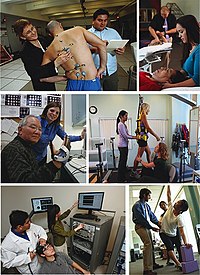
Photo from wikipedia
This study differentiated the contributions of physical and observational practice to the learning of a single-limb multi-joint coordination pattern. Three groups (physical-practice, observation-practice, observation-physical) practiced for 2 days and were given… Click to show full abstract
This study differentiated the contributions of physical and observational practice to the learning of a single-limb multi-joint coordination pattern. Three groups (physical-practice, observation-practice, observation-physical) practiced for 2 days and were given two performance tests 24 h after the second practice session. The performance tests revealed that physical and observational practice contributed similarly to identifying and using kinematic information related to the relative motion direction between joints (lead/lag relationship) and to the to-be-learned relative phase pattern (ϕ = 90°). Physical practice resulted in more stable coordination during performance tests and in the ability to produce different joint amplitudes with less variability. A serendipitous finding was that maximum elbow flexion (point of movement reversal) emerged as a kinematic event around which elbow and wrist coordination were organized. Movement reversals often serve to anchor the movement dynamics, and this anchoring effect was evident following both physical and observational practice, yet physical practice resulted in an advantage with regard to this anchor point on several kinematic measures. The results are discussed within the context of contemporary behavioral theories (coordination dynamics, visual perception perspective) of observational learning.
Journal Title: Psychological Research
Year Published: 2017
Link to full text (if available)
Share on Social Media: Sign Up to like & get
recommendations!